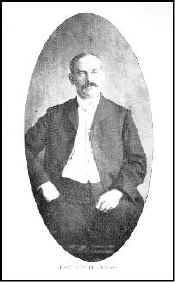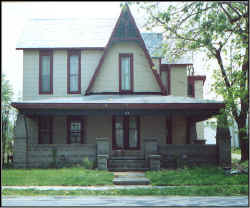"Childhood
is a preparation for life. It is my hope that the books I have written have enriched the
lives of children." So wrote Lois Lenski, gifted author and illustrator of
children’s books. She drew heavily on her own childhood and family life in Anna,
Ohio, to write her first creative work. Over the years, I have developed a deep interest
in Lois and the Lenski family. Like her, I grew up in Anna and can relate to her
background and experiences through my own.
Richard Charles Henry Lenski, the father of Lois, studied for the ministry at
the Lutheran Theological Seminary in Columbus, Ohio. Later upon earning his Doctor of
Divinity degree, he became dean of the seminary. He was a brilliant man whose personal
magnetism brought him early recognition. He wrote numerous religious books and
commentaries. He also possessed innovative talents, abilities, and hobbies. It was known
that he undertook every task with intensity and thoroughness both in his ministry and
personal life. Strict adherence to a schedule was his credo. Even as a pastor he found
time for his photography hobby and took all the pictures for the church and events in the
lives of parishioners
.
Skipping Village was one of Lois Lenski’s most popular books
and one of special attachment to the Shelby County, Ohio community. It
is closely based on Lenski’s growing up years in Anna and contains many references of
unmistakable origin. Architectural style of the homes on this book cover mimics that of
Anna homes, particularly the Lutheran parsonage pictured on the next page. To those who
have read the book, Skipping Village is Anna, or at least what Anna was 100 years ago.
Lenski Arrived 100 Years Ago
In 1899, the Lenski family took up residence in the Anna parsonage as
Pastor Lenski began his duties. In 1907, he saw the dedication of St. Jacob Evangelical
Lutheran Church which he helped design and oversee in construction. Today this 92 year old
edifice still stands as a testimony to his vision and foresight to build a magnificent
house of worship.
In 1930, my father, Rev. F.J. Mittermaier, became the pastor of St.
Jacob Church. He had been instructed at the seminary by Dr. Lenski. My father devoted all
his energy to the work of the Lord. He loved to read scripture in the original Greek and
would often have to be told to "put down his book and eat his oatmeal before it got
cold." Receiving an honorary Doctor of Divinity degree as the most outstanding rural
pastor in Ohio, he preferred not to be known by any title but that of pastor. Throughout
the 33 years of his ministry in Anna, he maintained the deepest regard for his mentor, Dr.
Lenski. For him it was a special blessing to be pastor of the Anna church. Often he loved
to go to the church, sit in the pew, and watch the rays of the setting sun as it shone
brilliantly on the head of Christ window above the altar.
In 1932, the congregation celebrated its 100th anniversary.
Dr. Lenski returned to preach. As a small child, I clearly recall seeing this man who had
olive skin, a heavy mustache, and intense blue eyes. Dressed in a white linen suit and
Panama straw hat, he was a striking figure as he smoked a large cigar. After asking
permission of my mother, he took my hand and off we went to the local ice cream parlor.
Marietta Young Lenski, mother of Lois, was
very gifted in her own right. She was a beautiful lady who dressed in the latest fashion,
in clothes which she sewed for herself. Skilled in all aspects of homemaking, she
regretted her lack of education. She enjoyed gardening and especially raising flowers, but
her dedication to the five Lenski children was her strongest passion.
My mother, Magdalene, reveled in both domestic and church
life. My father called her "his right hand." She loved to teach Sunday School
and together with my father organized and orchestrated the yearly children’s
Christmas program, youth pageant, and Vacation Bible School. She sewed extensively, was
known for her delicious baking, grew flowers, and arranged them in large baskets for
church services. There were four of us children to tend and nurture.

Lois Lenski's father, Rev. R.C.H. Lenski, pastor of Anna Lutheran
church
at the time it was dedicated in 1907.
Early Anna
Anna,
Ohio, in the early 1900’s was a perfect child’s town. It offered all a child
could enjoy and comprehend. Commonplace and ordinary, it had no particular beauty or
grace, but it soon became my own, a compound of sights and sounds and smells and buildings
and people that became a part of me...To have lived it and savored it and been a part of
it, has given me great comfort through ensuing years.
Journey into Childhood, The
Autobiography of Lois Lenski.
Lois wrote a great deal about the
parsonage in which she and I were both privileged to live. She felt it was "a perfect
house for children to grow up in." Her mother called the house preposterous and hard
to maintain. It had many, many rooms, seven gables with "gingerbread trim,"
small porches, long narrow windows, no gas, no electricity, no inside plumbing. Twenty-one
years later upon my family’s arrival, my Mother told one of the trustees to
"chop off a few rooms!" However, in time, we found need for all the space.

"This conglomeration of architecture, so many gables and roofs and porches,
made an inviting place for the boys to climb. They would go up to the highest peak of all,
yell down at us timid girls and try to frighten us." — Journey into
Childhood, The Autobiography of Lois Lenski, J.B. Lippincott Co., New York, 1972.
— Journey into
Childhood, The Autobiography of Lois Lenski, J.B. Lippincott Co., New York, 1972.

Detail from Lenski’s Skipping Village back cover flyleaf shows
clear similarity in architecture to the Lutheran
parsonage in Anna in which Lenski and
Mrs. Ressler lived some 30 years apart.
We soon discovered the closet
where Lois signed her name; we dug up remnants from Dr. Lenski’s photography; we
enjoyed the Concord grapes from the vines which the Lenski family had planted under the
arbor. The house was for both of our families a busy place and often the setting for a
baptism, wedding or stay by an overnight guest preacher. The door to the parsonage was
always open.
In 1961 Lois, then 68, returned to Anna to retrace her childhood footsteps.
Stopping at the parsonage, she asked my Mother if she could go through it once again and
point out some of the things she remembered. She went to the wooden archway between the
parlor and the dining room. There now covered with coats of varnish, but still legible,
were the initials of the five Lenski children and a dash beside each initial. She said her
father measured each child at the end of the year and whoever had grown the most got a
silver dollar.
In my possession is a book signed by Lois in which she thanks my Mother for
"letting her see again every nook and cranny of the old house." Over the years,
many changes have been made and many people have occupied the house, but yet it stands.
Lois penned her remembrance of
happenings in Anna: the little houses, stores, businesses, and schoolhouse. She vividly
recalled the names of childhood friends and acquaintances. Her dearest childhood friend,
having grown up, was our church organist for many years; another friend became the mother
of one of my close friends. The same neighbor lady we came to know so well had been
married by Dr. Lenski. The love and friendship of church people was always held dear by my
parents and I hold that same affection for those now gone and those who remain.

St. Jacob Lutheran Church,
Anna, Ohio. ca. 1915. The church was planned, built, and dedicated during the
pastorate of Rev. Lenski. (From a postcard in possession of Mr. & Mrs. Richard J.
Line)
As I have reflected on the life
of the Lenskis and my own family, the Mittermaiers, there seem to be parallels. The stance
of both was that life should not be lived in a worldly or materialistic fashion. First, in
the family’s life should be the church and all its facets. A pastor’s family
must strive to practice what the preacher preaches in keeping high standards and morals.
This is not an easy task as I can attest to when growing up.
Both of our families lived
frugally and adhered to the motto "waste not, want not." Lois used the paper
between cakes of shredded wheat for her sketching; my father used the back of signed
communion cards for notes which he carried in his shirt pocket.
Both sets of parents emphasized work and learning, but
above all a life of service, the joy of helping others and sharing with fellow travelers
on the road of life.
A hymn I recall puts it so
clearly: Fervent in spirit, serving the Lord, Not for world’s gain nor
the hope of reward, Only to minister, humble and meek, Only in all things His glory to
seek, Living to labor that others may live, Ready to love and to serve and to give.
As
an avid collector of Lois Lenski’s books, my appreciation of her and her family has
grown and deepened over the past 25 years. She and I both had wonderful parents, we lived
in the same house, we loved the church, grew up in the village of Anna, and called it our
childhood home.

Rev.
and Mrs. F.J. Mittermaier, Mrs. Ressler’s parents, were called in 1930 from
Willowdell in Darke County to the Lutheran post in Anna. They took up residence in the
same parsonage in which the Lenski family once lived. "This picture of my parents is
my favorite," writes the author, Marguerite Ressler. "This was taken on
Dad’s 40th year in the ministry. My Mother’s maiden name was Schmalz.
Translation: Chicken fat! My Dad totally disliked his name Felix and so always opted to go
by F. J. The J was for Julius. His third name was Richard and he loved that because that
was Dr. Lenski’s name."
Frugal Living
My mother had a frugal upbringing, without a father. She constantly
warned us of the sin of wastefulness. It was a sin to throw away or to waste food.
"Somewhere a child is hungry,"
Mama often said. "If you waste food, you will go hungry yourself some day." The
ladies of the Church packed missionary barrels to be sent to India and China. This was a
frugal period, too. Americans had not yet become "waste makers." We were taught
not to waste anything. We saved string and rolled it into balls. We saved wrapping paper
and used it over again. We hoarded used envelopes and backs of business letters to use for
writing and scribbling. My mother and grandmother used old clothing for carpet rags, to be
made into rugs. — Journey into Childhood, The Autobiography of Lois Lenski. |

